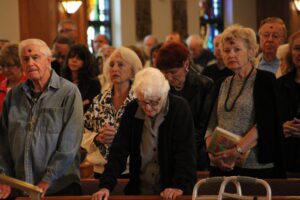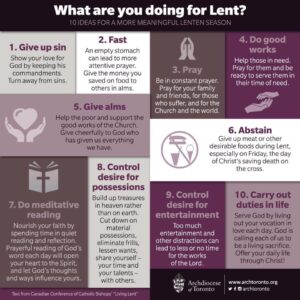The Lenten Season is an important time to take the opportunity to refocus one’s thinking on how to grow closer to God and farther away from evil.
Lent is one of the most important liturgical seasons of the Church’s calendar and begins on Ash Wednesday, Feb. 14, 2024. The faithful are prepared this season for Holy Week, those sacred days in the Church calendar when we celebrate the Passion, Death and Resurrection of Jesus Christ.
“The faithful are all called to know better their faith, to live it more deeply, and share their love of the Lord with others,” Bishop Frank J. Dewane said. “This ties in directly with our Lenten call to turn our lives over to Christ and to be more the man or woman of God calls us to be.”

Many opportunities are offered by the Lenten Season to take advantage of that concept of knowing, living, and sharing the faith, Bishop Dewane said. The Catechism of the Catholic Church reads, “The interior penance of the Christian can be expressed in many and various ways. Scripture and the Fathers insist above all in several forms; fasting and abstinence, prayer and charity, and almsgiving and self-denial, which express conversion in relation to oneself, to God, and to others” (CCC 1434).
These three pillars of the Lenten observance, fasting, prayer, almsgiving, express conversion in relation to oneself, to God, and to others. The Lord calls each person to total commitment. By practicing these observances together, they become more than the sum of their parts. They become part of a faith that flourishes and a heart that is increasingly dedicated to the Lord.
Fasting and abstinence
Fasting and abstinence is not about food, or lack of it, but instead about sacrifice for the benefit of our spiritual lives. Sacrifice and self-denial should not be viewed as something to lament, but instead should be viewed as an opportunity to remove anything that distracts us from Jesus Christ.
For early Christians, fasting was an important and meaningful Lenten practice in commemoration of Christ’s Passion and Death. The current Lenten discipline, set forth by the Roman Catholic Church, consists of both fasting and abstinence on Ash Wednesday (Feb. 14) and Good Friday (March 29), as well as abstaining from meat each Friday of Lent. Fasting and abstinence are about spiritual conversion and renewal, not solely about meat and no food.

“I encourage each of you to reexamine fasting and abstinence this Lenten Season and possibly rediscover them as virtues in the living of your life,” Bishop Dewane said. “When fasting, or abstaining from meat, this Lenten Season try not to just ‘follow the motions,’ so to speak, make an extra effort to improve upon the spiritual areas of one’s life.”
Prayer
The second Lenten pillar is prayer, which the Catechism tells us is coupled with charity. All Catholics are called to a meaningful prayer life. A prayer life includes both personal, which comes from the heart, and traditional prayer, with both dimensions the faithful grow closer to both Christ Himself — as well as to His Church.
“During Lent our prayer life should not only grow, but it should focus upon the areas of life in which we might have fallen short of God’s expectation—in other words, where we have sinned,” Bishop Dewane said.
Prayer is an indispensable component of the Catholic Faith. By growing and maturing in faith, prayer becomes an act of worship. As life progresses and one receives more of the Sacraments, and more often, prayer is recognized as a critical act of public worship in the Church, especially in the Holy Sacrifice of the Mass. Vatican II called the Mass “The Source and the Summit.”
The five basic forms of prayer are blessing, petition, intercession, thanksgiving, and praise. When someone prays in any one of these forms, they are expressing a different emotion, need, concern or appreciation. No two prayers from the heart are the same, just as no two conversations are the same.

“In prayer, we grow in the love of God and greater appreciation of who God is and what God does,” Bishop Dewane said. “In a world so full of uncertainty and loneliness, great comfort should be taken in knowing that by praying, God will offer His blessings and grace. By praying, the blessing upon us is returned. This is the beautiful exchange that needs to be part of one’s daily life.”
Almsgiving
The third pillar of Lent is almsgiving is coupled in the Catechism with self-denial. While often mentioned as the last of the three traditional pillars of the Lenten observance, is certainly not the least of the three and is often completely misunderstood. The Church’s expression of almsgiving is an act of self-denial, or an expression of charity and assistance extended to the needy.
By almsgiving during Lent, one not only expresses care for those in need, but also expresses a sign of gratitude for all God has provided in one’s own life. These acts of charity are connected to the responsibilities of living the faith that begins with baptism and is reignited in the Sacrament of Confirmation.

“All bear responsibility in helping our brothers and sisters in Christ, but it takes prayer and reflection to understand how God is calling each of us to give of oneself,” Bishop Dewane said. The Catechism states, “almsgiving, together with prayer and fasting, are traditionally recommended to foster the state of interior penance.”
“In a sense, almsgiving is a type of prayer,” Bishop Dewane said. “Because almsgiving requires sacrifice. It is also a sort of fasting from the material world, in that what could have been purchased.”
In addition, Bishop Dewane said the precept of confessing grave sins and receiving Holy Communion at least once during the Lenten Season merits a reminder.
To facilitate this requirement, every Parish in the Diocese of Venice will be open with a confessor present 4 to 8 p.m., Friday, March 22, and 9 a.m. to noon, Saturday, March 23. Check with your local Parish for additional confession times or the availability of a Penance Service. These opportunities are made available so that the faithful may find ample opportunity to receive God’s Mercy in the Sacrament of Reconciliation.





